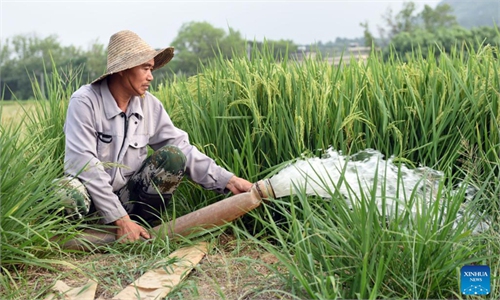Heat wave disasters on the horizon
Regions will become uninhabitable, warn UN, Red Cross
Heat waves will become so extreme in certain regions of the world within decades that human life there will be unsustainable, the United Nations and the Red Cross said on Monday.
Heat waves are predicted to "exceed human physiological and social limits" in the Sahel, the Horn of Africa and South and Southwest Asia, with extreme events triggering "large-scale suffering and loss of life," the organizations said.
Heat wave catastrophes in 2022 in countries like Somalia and Pakistan foreshadow a future with deadlier, more frequent, and more intense heat-related humanitarian emergencies, they warned in a joint report.
The UN's Office for the Coordination of Humanitarian Affairs and the International Federation of Red Cross and Red Crescent Societies (IFRC) released the report in advance of November's COP27 climate change summit in Egypt.
"We don't want to dramatize it, but clearly the data shows that it does lead toward a very bleak future," said IFRC Secretary-General Jagan Chapagain.
They said aggressive steps needed to be taken immediately to avert potentially recurrent heat disasters, listing steps that could mitigate the worst effects of extreme heat.
"There are clear limits beyond which people exposed to extreme heat and humidity cannot survive," the report said.
"There are also likely to be levels of extreme heat beyond which societies may find it practically impossible to deliver effective adaptation for all.
"On current trajectories, heat waves could meet and exceed these physiological and social limits in the coming decades, including in regions such as the Sahel and south and southwest Asia."
It warned that the impact of this would be "large-scale suffering and loss of life, population movements and further entrenched inequality."
The report said extreme heat was a "silent killer," claiming thousands of lives each year as the deadliest weather-related hazard - and the dangers were set to grow at an "alarming rate" due to climate change.
According to a study cited by the report, the number of poor people living in extreme heat conditions in urban areas will jump by 700 percent by 2050, particularly in West Africa and Southeast Asia.
"Projected future death rates from extreme heat are staggeringly high - comparable in magnitude by the end of the century to all cancers or all infectious diseases - and staggeringly unequal," the report said.
Agricultural workers, children, the elderly and pregnant and breastfeeding women are at higher risk of illness and death, the report claimed.
Chapagain urged countries at COP27 to invest in climate adaptation and mitigation in the regions most at risk.
Heat waves are predicted to "exceed human physiological and social limits" in the Sahel, the Horn of Africa and South and Southwest Asia, with extreme events triggering "large-scale suffering and loss of life," the organizations said.
Heat wave catastrophes in 2022 in countries like Somalia and Pakistan foreshadow a future with deadlier, more frequent, and more intense heat-related humanitarian emergencies, they warned in a joint report.
The UN's Office for the Coordination of Humanitarian Affairs and the International Federation of Red Cross and Red Crescent Societies (IFRC) released the report in advance of November's COP27 climate change summit in Egypt.
"We don't want to dramatize it, but clearly the data shows that it does lead toward a very bleak future," said IFRC Secretary-General Jagan Chapagain.
They said aggressive steps needed to be taken immediately to avert potentially recurrent heat disasters, listing steps that could mitigate the worst effects of extreme heat.
"There are clear limits beyond which people exposed to extreme heat and humidity cannot survive," the report said.
"There are also likely to be levels of extreme heat beyond which societies may find it practically impossible to deliver effective adaptation for all.
"On current trajectories, heat waves could meet and exceed these physiological and social limits in the coming decades, including in regions such as the Sahel and south and southwest Asia."
It warned that the impact of this would be "large-scale suffering and loss of life, population movements and further entrenched inequality."
The report said extreme heat was a "silent killer," claiming thousands of lives each year as the deadliest weather-related hazard - and the dangers were set to grow at an "alarming rate" due to climate change.
According to a study cited by the report, the number of poor people living in extreme heat conditions in urban areas will jump by 700 percent by 2050, particularly in West Africa and Southeast Asia.
"Projected future death rates from extreme heat are staggeringly high - comparable in magnitude by the end of the century to all cancers or all infectious diseases - and staggeringly unequal," the report said.
Agricultural workers, children, the elderly and pregnant and breastfeeding women are at higher risk of illness and death, the report claimed.
Chapagain urged countries at COP27 to invest in climate adaptation and mitigation in the regions most at risk.



